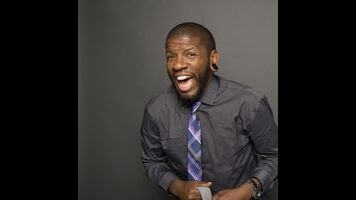Quincy Jones was an aspiring L.A. stand-up comic, working the requisite barista job while at one point meeting a goal of doing 1,000 gigs in one year. He was diagnosed with terminal cancer in 2015. He’s undergoing chemotherapy and has a year to live, say doctors. A pair of comic friends (Nicole Blaine and her husband, Burning The Light director Mickey Blaine), knowing that Jones’ final wish was to have his own hour-long stand-up special, set up a Kickstarter to raise the estimated $5,000 budget. After the story was picked up by Ellen DeGeneres on her talk show, they raised 10 times that amount. DeGeneres helped Jones’ special, Burning The Light, secure a spot on HBO. The widely seen clip of him getting the news is here, in case you want a good cry.
The story is both inspirational and wrenching, especially once you see clips of the pre-diagnosis Jones onstage. Just another young, working comic, tall and easygoing, with a winning smile and a relaxed presence. Cancer sucks—and it sucks that Jones will never get to develop as a comic, which is what he’s always wanted to be. It makes evaluating Burning The Light that much more difficult, as separating Jones’ work from the special’s effusive audience and the looming circumstance of his impending death becomes all but impossible.
To his credit, Jones isn’t milking that response. Burning The Light sees the comic referencing his situation from time to time (speaking of his unique difficulties related to online dating, he muses over his OkCupid profile, “define ‘long-term’”), but without letting his and his audience’s shared knowledge subsume his desire to show what he can do on the biggest stage of his career. Jones toys deftly throughout with making the audience uncomfortable with some solid dark comedy. Speaking of his “relief” at his cancer diagnosis (he was originally thought to have coeliac disease), he talks of being able to eat real spaghetti again, and of how embarrassed he used to be going out to restaurants (“Look man, you got any gluten-free pasta in the back?”). He references Ellen (“white Oprah”) and her largesse, before swerving to claim that he’d stick with his current success over a cure any day. (“With all these credits I’m getting right now? Keep the cure—more Ellen money.”) And, noting all the attention his story has gotten, he confesses that he’d better die soon, or people are going to get angry (“I can’t be the Magic Johnson of cancer.”) This bold material succeeds in getting on top of a subject that otherwise could become the whole show. Like all comedians, Jones is incorporating his life into his material. His life just so happens to include a horrifying truth that he nonetheless manages to mine for laughs.
The rest of the time, Jones (it’s mandatory at this point to mention that he’s no relation to another Quincy Jones) is just what he is—a young stand-up comic trying to do a great set. There are reminders of his condition, sure—Jones jokes about how winded he got just running out from the wings, and his delivery has a breathy quality to it throughout. (He confesses that he has another round of chemo scheduled for the next day.) And director Blaine doesn’t cut away from the long minute where Jones laboriously uncaps his bottled water, a poignant choice that he acknowledges with the puncturing laugh line, “I wish I had opened these waters before I came on stage. I was really struggling.”
But, if achieving an HBO special on the basis of his comedy alone was something Jones was striving for, it wouldn’t be fair to judge his performance on any other basis. And if Jones’ material isn’t stellar, it’s certainly consistently funny, with plenty of potential. There’s a fair amount of relationship material (about “celebrity cheat lists,” and storming out on a fight when you don’t own a car) and “white people and black people are different” jokes that aren’t exactly revelatory, but coast along on Jones’ easy charisma. His observational material is likewise pleasant, with occasional flashes. (Regarding the discount supermarket Food 4 Less, Jones proclaims it’s like “if a grocery store building could sigh in defeat.”) He skates over some political material with thoughts on how to get police to stop shooting black people (always carry little dogs, so that PETA gets involved) and the idea that “all bad things in history started with a white girl crying” without delving too deeply. Jones has a way with patience that works for him—he knows when to wait for a laugh, and when to let a joke breathe. But there’s a choppiness to the segues, with premises being picked up and dropped sometimes without developing sufficiently.
Burning The Light is an entertaining, solid set from a charismatic comic (he does some fine crowd work all through the special) who will never have a chance to develop better ones. When Jones, having carried his appreciative audience along with him to the end of the hour, basks in their immediate and emotional standing ovation, it’s hard not to be swept up in the moment. Burning The Light is a good story, a decent comedy special, and a creditable way for a promising comic to go out.








































